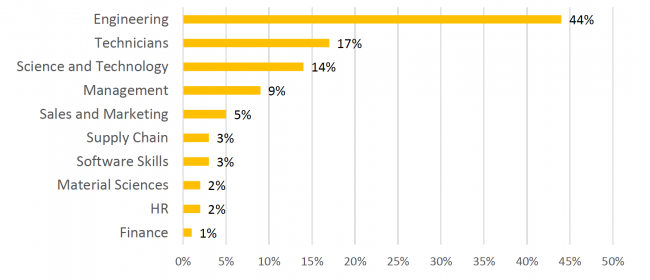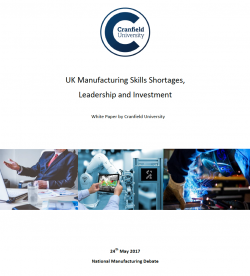2 minute read
Skills shortages discussed at National Manufacturing Debate
New analysis by Cranfield University has revealed key skills shortages within manufacturing. The University’s report highlights that leadership, innovation and management are all non-technical skills, frequently cited as lacking within the manufacturing sector.
The report released at the National Manufacturing Debate also reveals shortages of technical skills in the areas of robotics and artificial intelligence, software skills, data analysis and electronic and electrical engineering.
The information was gathered by the University after a systematic review and analysis of over 350 reports from Government, trade NGOs (Non-Governmental Organisations) and the media.

The top ten skills in short supply / Graphic: Cranfield University
Analysis of the reports from Government and trade NGOs, such as EEF, reveal that 62% of reports mentioned a shortage of skills in robotics and artificial intelligence, 55% reveal a shortage of data analysis skills and 46% reveal a shortage of innovative skills.
The report points to five key reasons for skills shortages within manufacturing:
• Young people in the UK have less interest in manufacturing related subjects;
• Female employment in manufacturing is far less than male employment;
• The perception that employees have lower income in the manufacturing sector;
• The lack of applicants with the right skills to fill open posts; and
• UK manufacturing has an ageing workforce which needs replacements quickly.
Analysis has also revealed that responsibility for addressing the skills shortage is not clearly defined, with employers looking to Government and Government looking to employers to address the issue.
The report’s key recommendations include:
• Employers to work closely with Universities and Schools to design the curriculum
• Government should encourage strategic use of the ‘apprenticeship levy’
• Educational and engineering institutions should work together to raise awareness of manufacturing careers
• Improvements should be made in the quality of manufacturing apprenticeships
• Strategic overseas recruitment for short term to plug current skills gaps
• All stakeholders of manufacturing should work together to tackle this sector-wide challenge
The report’s contents were discussed at the eighth, annual National Manufacturing Debate hosted by Cranfield University.
Launching the National Manufacturing Debate White Paper 2017, Professor Rajkumar Roy, Director of Manufacturing at Cranfield, said:
“This analysis shows that the sector faces some key challenges in skills development that will have long-term implications for manufacturing productivity in the UK. Our report also highlights a lack of clarity as to who is responsible for tackling this skills deficit with employers looking to Government and the Government looking to employers.
“All of us involved in manufacturing, industry, schools and universities, must work together, as a matter of urgency to address this critical skills shortage.
“We must implement industry, school and university collaboration to design the teaching curriculum, so that what is being taught reflects the latest developments in manufacturing. We should monitor our progress on this through OFSTED for schools and the Teaching Excellence Framework for universities.”
You can download the full report directly by clicking the link below:
(external link, direct download)

